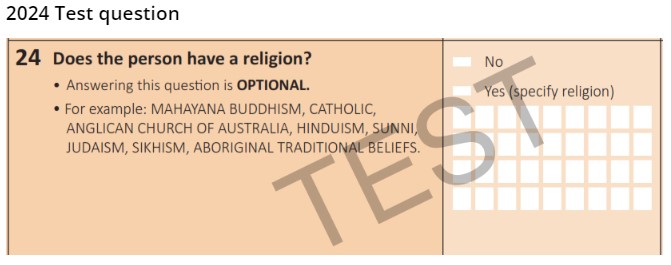Religion and the census – seeking accuracy and truth
July 21, 2024
Based on the response to the Australian Bureau of Statistics’ (ABS) proposed change to the religion question for the 2026 census, religious groups are singing from the same misprinted hymn sheet.
Paul Collins’ recent article, “Religion and the census” (Pearls and Irritations, 8 June 2024), serves as a faithful echo of the article published by Archbishop Timothy Costelloe in The Australian on 30 April 2024.
The Archbishop’s piece, "Changing measure of faith will weaken census data", stated that, under proposed changes to the 2026 census question on religion, there would be a tick box for a ‘No’ response but no equivalent for ‘Yes’ responses. But, as a simple check of the proposed question released by the ABS will reveal, this statement is not correct.
In fact, the proposed question features a tick box for both ‘No’ and ‘Yes’ responses, followed by a text entry area in which people can provide details of their specific religion or denomination.

Mr Collins and several Catholic media outlets repeated Archbishop Costelloe’s incorrect claim.
In his article, Mr Collins went on to presume that the motivation of the ‘ Census21 – Not Religious?’ campaign to change the question came primarily from a desire to decrease the funding given to religious organisations and to “push religion out of public life”.
The ‘Census21 – Not Religious?’ campaign leading up to the 2021 census was organised by an alliance of national and state pro-secular groups, including Humanists, Atheists and Rationalists. As stated in all campaign materials, the primary aim was to improve the accuracy of data collected in the census so that it better reflected the reality of people’s current relationship with religion in Australia.
The campaign attempted to achieve this aim by calling for change to the ‘leading’ census question to remove the question’s inherent bias, and by encouraging Australians to more carefully consider their response to the question.
Mr Collins clearly doubts the honesty of this, perhaps forgetting that our submission to the ABS consultation which formed part of planning for the 2026 census was certainly not the only one arguing for change. As it happens, the question on religion attracted the largest number of submissions in the consultation.
In the 2021 census, respondents were asked “What is the person’s religion?” In psychology, this is known as an assumption-based leading question. It presumes a particular condition or fact – that the person has a religion – and guides respondents’ answers to conform with that assumption. The outcome is acquiescence bias, distorting the accuracy of the final counts.
Mr Collins suggests that direct comparability with past census results – using the same question wording – is more important than collecting accurate data.
The ABS will soon begin testing the proposed new religion question: “Does the person have a religion?” Regarding this new wording, Mr Collins repeats Archbishop Costelloe’s contention that this question “disengages religion from identity and culture and introduces a bias in favour of ‘no religion’.”
We agree that the proposed question may have this effect and would argue that religion is the most dynamic dimension of cultural background. Other dimensions, such as birthplace and ancestry, are fixed and not subject to changing beliefs.
But, given that the purpose of the census is to take a demographic snapshot of the country and its evolving culture, we believe current and accurate data is more important than continuing to compare flawed data with flawed data.
The existing question leads respondents to draw on their personal backgrounds, including parents’ religion, school attended, and previous practices and beliefs. None of these things are relevant to a person’s current relationship with religion.
Mr Collins also quotes Dr Trudy Dantis of the Catholic Bishops’ National Centre for Pastoral Research as saying that the proposed new question will “create a ‘double bias’ against people of faith”. The proposed change is designed to remove any bias by using a neutral question to produce the most accurate and meaningful data. For some, it seems that bias is acceptable as long as it favours the right people.
The existing question asked people to tick a box against a list of the 10 most common religions with a box for people to write in other options. The ‘Census21 – Not Religious?’ campaign did not have a strong view on this matter but acknowledged the impracticality of listing all 139 categories in the official classification of religions. In response to a question from Senator Dean Smith, the ABS’ head statistician Dr David Gruen told Senate estimates in June 2024 that it was faith groups that had complained about the census listing some religions but not others.
In relation to tick boxes, it seems Mr Collins and Archbishop Costelloe want to have their cake and eat it too. On one hand they argue that the tick boxes mask important sub-groups within the larger religions, but on the other they argue that a write-in response will cause confusion and result in further inaccuracy or a lower response.
We accept the need to accurately capture the religious beliefs of all respondents in today’s multicultural and plural society. A single text field puts all religions on an equal footing and will encourage more diverse and accurate responses.
In summary, the two proposed changes – one in the wording of the question, and the other replacing a tick box listing with a free-form text box – will provide more accurate and detailed data on religion. This may or may not result in a redistribution of government funding. But, if the result is a stronger evidence base to inform all policy and funding decisions, this should outweigh the case to persist with a flawed question. Artificially inflated figures – for any religion or none – serve nobody’s interest in responsible planning for the future.
